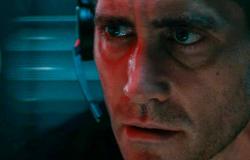
At just twenty-nine years old, British director Rose Glass showed the world that she had a couple of interesting ideas to bring the Christian horror subgenre closer. In Saint Maud: saving souls (2019), which in Argentina had a fleeting stint on online rental platforms during the pandemic, Glass created a particular version of the ordeal and the search for a possible redemption thanks to the story of a home nurse obsessed with her new patient, a former high-class dancer going through the final stages of a terminal illness. Fertilizing the protagonist’s fantasies from her hallucinations with a lot of martyrology, but without abandoning the terrain of the earthly, Saint Maud It offered a particular reformulation of topics and iconography under a new and healthy cinematographic light. Five years later, the filmmaker supports the second brick of her filmography by abandoning the homeland, as well as her terrifying references.
Love, lies and blood (the Spanish title abandons the pun of the original Love Lies Bleeding, which is the familiar name in English of the plant known as amaranth and can also be translated as “Love lies bleeding”) travels to the heart of the American southwest to immerse itself in the waters of neo noir, the story of girls in a state of rebellion and hyperviolent fantasy, baking with all those basic elements a story of survival in a world controlled by the forces of darkness. And those of patriarchy, understood in this case both symbolically and extremely literally. To bring the central triangle of characters to life, Glass enlisted the support of two big names. On the one hand, Kristen Stewart, who once again demonstrates her interest in participating in projects completely removed from glamor or prestige; on the other, the enormous Ed Harris, who here creates one of the most unpleasant and malicious creatures in his entire career, both accompanied in supporting roles by Dave Franco and Jena Malone. To complete the three points, the karate fighter and actress Katy O’Brian abandoned her career in superhero movies for a while (she was Jentorra in Ant-Man and the Wasp: Quantumania and Kimball in the series Agents of S.H.I.E.L.D.) to give life to a woman who is both powerful and fragile, the disruptive element in a human universe whose balance seems to be held by a handful of weak pins. After participating in the Sundance and Berlin festivals, Love, lies and blooda film without fear of ridicule and with a huge pulp heart, arrives in local movie theaters on Thursday.
A FILM ABOUT AMBITION
There is nothing further from the dark perfection of Bella Swan than the first image of Lou at the beginning of Glass’s film: the young employee of a neighborhood gym, somewhere lost in New Mexico, bends down and inserts her entire arm into in the toilet with the intention of unclogging it. She succeeds, but not before proudly watching the shapeless mass of fecal matter, urine and pulverized toilet paper slide in a spiral towards the drain. Glass is not afraid to put his hand into shit and, in some way, that presentation of the character partly defines the virulent nature of his second feature film. In parallel, Jackie (O’Brian in anabolics), a girl who loves bodybuilding on her way to a contest in Las Vegas, meets Lou’s brother-in-law and, through him, gets a job at a shooting range located in the suburbs. from the city. That the owner of the place is precisely Lou’s father, a sort of shadowy boss of the region supported by carnal connivance with the police, only lays the foundations for the conflicts that will soon appear. Before that happens, when Lou meets Jackie and vice versa, there is one of those sparks followed by combustion that cinema has exploited throughout its history. But these girls are not called Thelma and Louise, even though the story takes place towards the end of the 80s, and any attempt to define Love, lies and blood as a feminist manifesto for Generation Z definitely falls sooner rather than later.
The thing is that Glass doesn’t seem to care too much about “messages” or overlapping the elements of the story in such a way that they remain comfortably located on the shelves of well-considered discursive correction. On the contrary, it is sweat, blows, tantrums, hatred, desire and, of course, blood, that move the characters. “The idea of writing a story centered on a female bodybuilder began to float around during the editing of Saint Maud”. In conversation with the specialized magazine Filmmaker, Rose Glass recounted the twists and turns when it came to finding the place to set the action. “We wrote the script together with the director Weronika Tofilska, with whom we have been friends for years, and at first the story took place in the United Kingdom, perhaps Scotland. But as we moved forward, there was something that made us noise. The United States seemed like a much more appropriate place, since there are characters committing crimes and there are a lot of weapons running around. Also, in a sense, the film is about ambition, a slightly cynical look at the American Dream. I guess it also revolves around the ego. There were many elements that made the United States the most powerful place to crystallize the world in which the story takes place. Without us realizing, Love, lies and blood became a movie about movies, although not literally. Without there being specific references to other titles, the audience knows all those cinematic tropes, and placing the story there made it easier to play and subvert those elements in a more daring way.
“You’re not just some crazy straight guy who wants to experiment, are you?” Lou spits at Jackie before the path of first kisses opens to a much more intimate contact. And so, the link between the two is sealed, without awareness that very soon the bodily fluids of desire will give up the central space to that other one that sustains life, at least when it circulates through the veins. And the shots are fired from the least expected place, when the blows that JJ (Franco) usually delivers to his wife Beth (Malone) go too far. Already after forty minutes of screening, the catalytic effect occurs that drives the rest of the actions and reactions. As if Jackie were the executing arm of Lou’s repressed desires, a kind of Mr. Hyde or Incredible Hulk that does not emerge from the body of Dr. Jekyll or his colleague in the profession David Banner but from the surrounding space. So, Love, lies and blood becomes a particular version of the revenge film that includes bodies scattered in the wildest nature, lightning trips to Las Vegas, threats that go beyond the logical paternal challenge and penance and a nightmarish structure, an alley with no other exit than the violence, which the director builds from lowest to highest, escalating the level of savagery and, yes, also that of absurdity. As in an old black detective story in which the story begins to complicate itself to unsuspected limits and the characters fail to realize that each step they take entangles them even more in the center of a labyrinth with no exit in sight. As if the film itself were injecting itself with increasing doses of those anabolics that Lou gives to Jackie to enhance his muscles before the competition in Las Vegas.
In the aforementioned interview, Glass states that she is not sure that the film necessarily falls into the category lesbian pulp which many reviews pointed out as something obvious. “At a certain point in the film you briefly see the cover of the book Male Sluts, by Pat Califia, which includes a handful of very good and very BDSM short erotic stories. We even thought that could be a good title for the film. But they are also a huge fan of John Waters and his work was one of the influences. Also Thief’s Diary, the book by Jean Genet, which I read a while ago. I think there is a connection between Waters and Genet, their attitude towards transgression and crime as something beautiful. At one point I wanted Lou’s character to have a poster of Female TroubleWaters’ film, but we couldn’t due to rights issues.”
LOVE IS STRONGER
The long-haired guy (there is no contradiction in terms) that Ed Harris embodies is a man with a (criminal) history and a present in which the status quo must be sustained no matter what the cost and whoever falls. And when the potatoes begin to burn (to burn, even) the heroines’ path – not exempt from suspicions, some crises and, finally, a false abandonment – is sealed forever. Because love is stronger, especially if it is based not only on attraction and affection, but also on still bleeding corpses hidden under pressure. The final catharsis (the film is, above all, a cathartic game) includes the wildest fantasy. A big, kitsch fantasy, the most absurd demolition of the paterfamilias, who cares little or nothing that his daughter is a lesbian – there is nothing in the film that underlines the theme, it is just a descriptive detail of the characters – but it does laws and mandates are confronted and questioned. Meanwhile, on tube televisions, images of the fall of the Berlin Wall reflect the decline of that small family empire that Lou for a long time wanted, without success, to degrade. Until the appearance of Jackie, of course, who enters the Las Vegas stage like a professional but ends up self-sabotaging her participation like a Carrie White without colleagues to bully her. And speaking of Las Vegas and the stages, according to Rose Glass herself there is another film that is unexpectedly part of the DNA of Love, lies and blood. “Of course there is a relationship with Wild Heart, Thelma and Louise and wild escape, all those movies with loving couples and guns and murders. But I didn’t want to revisit them, it was a matter of feeling their essence, rather than having a lot of visual references. There’s always something intense and melodramatic when playing those songs, but I knew I needed a catchy, sweaty tone. Showgirls is one of those movies that I remember seeing one night, very late, on television, when I was probably still too young to see it. “People have very different opinions about that film, but no matter what they say, the drive of its story is truly crazy.”





